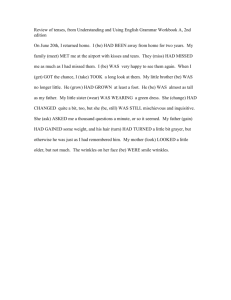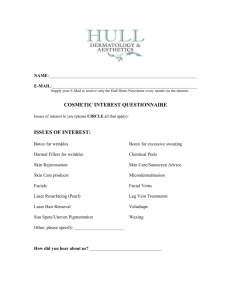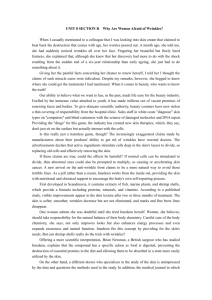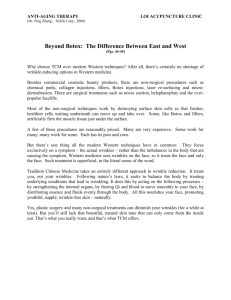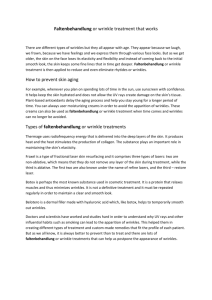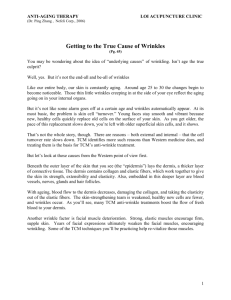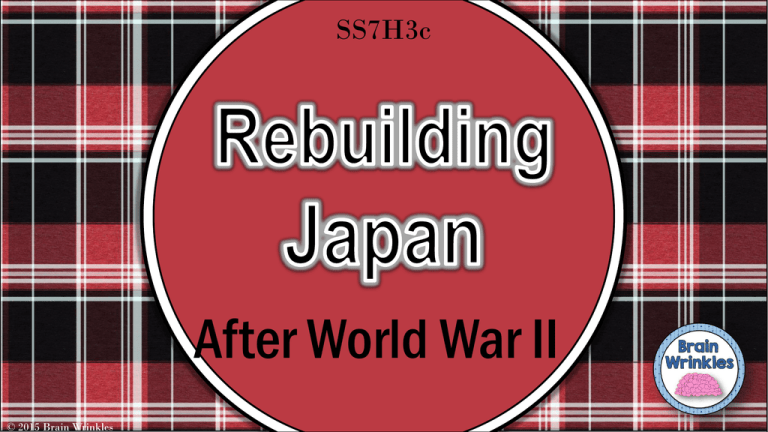
SS7H3c
After World War II
© 2015 Brain Wrinkles
Standards
SS7H3 The student will analyze continuity and change in
Southern and Eastern Asia leading to the 21st century.
c. Explain the role of the United States in the rebuilding of Japan
Japan after WWII.
© 2015 Brain Wrinkles
• On December 7, 1941, Japanese airplanes made a
surprise attack on the US naval base at Pearl Harbor in
Hawaii.
• More than 2,400 people were killed, and many US
battleships and airplanes were destroyed.
© 2015 Brain Wrinkles
The USS Arizona
After the Japanese
Surprise Attack on
Pearl Harbor.
© 2015 Brain Wrinkles
President Roosevelt
called December 7,
1941, “a day that will
live in infamy.”
© 2015 Brain Wrinkles
• The next day, President Roosevelt asked Congress to
declare war on Japan.
• They agreed and the US officially entered WWII on
December 8, 1941.
• On December 11, Germany and Italy declared war on
the US.
• The US was now deeply involved in WWII on the side
of the Allies.
© 2015 Brain Wrinkles
Roosevelt Signing Declaration of
War Against Japan.
© 2015 Brain Wrinkles
Hitler Declares War on the US – 1941.
© 2015 Brain Wrinkles
• In 1944, the US followed an “island-hopping” campaign
in the Pacific.
• US forces attacked island after island held by the
Japanese.
• This campaign brought American troops closer and
closer to Japan.
© 2015 Brain Wrinkles
• Fighting Japan was difficult because the Japanese were
fierce warriors.
• The Japanese soldiers never gave up and were willing to
sacrifice themselves for their country.
• Japanese kamikaze pilots crashed their planes into US
ships on purpose, fully expecting to die.
© 2015 Brain Wrinkles
An Aircraft Carrier
Hit By Kamikaze
Planes – 1945.
© 2015 Brain Wrinkles
• In February 1945, American forces invaded the island of Iwo
Jima.
• The island was important because it was close to Japan and it
was a good place for US planes to land.
• The Japanese protected the island with traps and underground
tunnels.
• It was a fierce battle, but the US Marines eventually took the
island.
© 2015 Brain Wrinkles
US Marines Approach Iwo
Jima.
© 2015 Brain Wrinkles
US Marines Fire at
Japanese Cave
Positions in
Iwo
Jima.
© 2015 Brain Wrinkles
US Marines finally
reached the highest
point on the island
and raised the
American flag in
victory.
© 2015 Brain Wrinkles
• The Allies thought about invading Japan, but were
worried that too many soldiers would die.
• President Harry Truman made a difficult decision to
use nuclear weapons against Japan.
• He warned the Japanese government to surrender, but
they refused to give up.
© 2015 Brain Wrinkles
• On August 6, 1945, an American bomber plane dropped the first
atomic bomb ever used in war on the Japanese city of
Hiroshima.
• A few days later, the US dropped a second bomb on Nagasaki.
• Both cities were completely devastated, and the Japanese
finally agreed to surrender.
• Japan is the only country in the world that has been attacked
by nuclear weapons.
© 2015 Brain Wrinkles
The Enola Gay dropped
the “Little Boy” Atomic
Bomb on Hiroshima.
© 2015 Brain Wrinkles
Mushroom Cloud Over
Hiroshima.
© 2015 Brain Wrinkles
© 2015 Brain Wrinkles
Hiroshima Aftermath
Mushroom Cloud Over
Nagasaki.
© 2015 Brain Wrinkles
• The two sides signed formal surrender papers on the US
battleship Missouri on September 2, 1945.
• This day is officially known as VJ Day – Victory in
Japan Day.
© 2015 Brain Wrinkles
Japan Surrenders
Aboard the USS
Missouri,
September 2, 1945.
© 2015 Brain Wrinkles
© 2015 Brain Wrinkles
© 2015 Brain Wrinkles
• After Japan’s surrender, Japan’s economy and
government were devastated.
• Industries and farms were destroyed and the emperor
was exposed as a mere mortal and not a god.
• The country’s infrastructure (transportation,
communication, sewage, water, and electric systems)
was demolished.
© 2015 Brain Wrinkles
© 2015 Brain Wrinkles
• The US had a plan to occupy and rebuild Japan in a
way that would guarantee the country would not pose a
military threat to others in the future.
• General Douglas MacArthur was sent to oversee Japan’s
restoration.
• The US occupied Japan from 1945 to 1952.
© 2015 Brain Wrinkles
• General MacArthur ordered Japan’s military to be
disbanded and closed all weapons factories.
• He also directed that government and military leaders
involved in World War II were brought to trial and
punished.
• In addition, MacArthur helped Japan install a new
democratic government.
© 2015 Brain Wrinkles
General Douglas MacArthur
and
Emperor Hirohito
© 2015 Brain Wrinkles
• MacArthur decided that Japan would be a constitutional
monarchy in order to preserve the emperor’s role in the country’s
culture.
• He wrote Japan’s constitution, still referred to as The MacArthur
Constitution, and it is still considered one of the most democratic
documents in the world today.
• The constitution set up a two-house parliament called a Diet.
• Japanese citizens were granted many of the same rights as
American citizens.
© 2015 Brain Wrinkles
Elections in Tokyo
1952
© 2015 Brain Wrinkles
• Japan’s constitution also prevents the country from
declaring war of fighting with other countries (unless
they are attacked first).
• After signing the new constitution, the Japanese
government pledged to pay reparations to the countries
that they harmed during WWII.
• The Japanese were also not allowed to rebuild their
military in any way.
© 2015 Brain Wrinkles
Japan’s Constitution
© 2015 Brain Wrinkles
• The US offered financial support to help kick start
Japan’s economy after WWII.
• This money coupled with a strong Japanese work ethic
led to a boom in Japan’s economic growth.
• Much like the US, Japan leans towards a market
economy, which motivates its citizens to develop new
ideas and expand businesses.
© 2015 Brain Wrinkles
• On April 28, 1952, Japan became a fully sovereign nation.
• America’s occupation and MacArthur’s rebuilding of Japan has
had a positive lasting effect.
• Today, the country has one of the most stable democratic
governments in the world.
• Japan also has one of the most powerful industrialized
economies in the world.
© 2015 Brain Wrinkles
Tokyo, Japan
© 2015 Brain Wrinkles
Teacher Info – Comprehension Questions
• Students should answer the questions after discussing the
presentation. Afterwards, check and share answers as a class.
• *You can also use this as a quiz!
© 2015 Brain Wrinkles
1. What happened on December 7, 1941?
2. How did the US react to the Japanese bombing of Pearl Harbor?
3. Why did President Truman decide to drop the atomic bombs on Japan?
4. On which Japanese city was the first atomic bomb ever used in war dropped?
5. The Japanese surrendered after the second atomic bomb was dropped on this
city:
6. The day that Japan surrendered is known as:
7. Why did the US occupy Japan from 1945 to 1952?
8. What US General was given the job of rebuilding Japan?
9. What type of government was established in Japan?
10. What does Japan’s new constitution say about war?
© 2015 Brain Wrinkles
1. What happened on December 7, 1941?
Japanese bombed Pearl Harbor
2. How did the US react to the Japanese bombing of Pearl Harbor?
President Roosevelt asked Congress to declare war on Japan—they agreed
3. Why did President Truman decide to drop the atomic bombs on Japan?
He knew that it would save many American lives and that Japan would eventually
surrender.
4. On which Japanese city was the first atomic bomb ever used in war dropped?
Hiroshima
5. The Japanese surrendered after the second atomic bomb was dropped on this
city:
Nagasaki
6. The day that Japan surrendered is known as:
VJ Day (Victory in Japan Day)
7. Why did the US occupy Japan from 1945 to 1952?
Japan’s government, economy, and infrastructure was completely demolished. They
needed help rebuilding & the US want to make sure that they wouldn’t be a
military threat to other countries in the future.
8. What US General was given the job of rebuilding Japan?
General Douglas MacArthur
9. What type of government was established in Japan?
Constitutional Monarchy
10. What does Japan’s new constitution say about war?
Japan can never declare war on another country – can only fight if they are
attacked first.
© 2015 Brain Wrinkles
Teacher Directions – I Spy…
• Have the students draw one of the major events from Japan’s history
(during this time period) in one of the binocular lenses.
• Examples: Atomic bombings, Surrender/VJ Day, New Constitution,
etc.
• In the other lens, they will write a paragraph from their perspective of
the event—as if they were right there spying on the event.
© 2014 Brain Wrinkles
Directions: In one of the binocular lenses below, draw an event that occurred in Japan during this time period. In the other lens, write a paragraph from your perspective of the event—as if
you were right there spying on the event.
© 2014 Brain Wrinkles
Teacher Directions – Japan: Before & After Mascots
• Have the students create mascots to represent Japan before and after
US occupation.
• They will name & draw an illustration of the mascot.
• They will also write a description about how/why the mascot
represents time period in Japan’s history.
© 2014 Brain Wrinkles
Japan: Before & After Mascots
Directions: Create mascots to represent Japan before and after US occupation (and rebuilding). Think about all of the information that you have learned about the destruction in Japan after
WWII and the ways that Japan changed after US occupation. You will create an illustration of each mascot. You will also write an explanation as to why the mascots were chosen to represent
each time in Japan’s history.
“Before” Mascot Name:
“After” Mascot Name:
“Before” Mascot Description:
“After” Mascot Description:
© 2015 Brain Wrinkles
Teacher Directions – TIME Man of the Year
• The students will create a Time Magazine “Man of the Year” spread for
General Douglas MacArthur.
• They will draw a picture of MacArthur and write a paragraph about
why he was chosen for this honor.
• *The slide with red text has helpful hints for the students so that they
know what to write/draw in each section.
© 2015 Brain Wrinkles
Man of the Year
Year
Draw an illustration of General
Douglas MacArthur OR of
something that he did when
rebuilding Japan.
Write a short
caption that
includes
MacArthur’s full
name & what he’s
known for.
© 2015 Brain Wrinkles
Write a description that includes
who MacArthur is and why he
was selected as the Man of the
Year.
Man of the Year
© 2015 Brain Wrinkles
Teacher Directions – Ticket Out the Door:
• Cut up (4 to a page) and pass out the Ticket Out the Door to each student.
• They should answer the question at the end of the lesson and turn it in to you on
the way out of class.
• Quickly read through the responses and share a few of the best during class the
next day.
© 2015 Brain Wrinkles
What do you think Japan would look like today if
the U.S. had not helped in the rebuilding process?
© 2015 Brain Wrinkles
What do you think Japan would look like today if
the U.S. had not helped in the rebuilding process?
© 2015 Brain Wrinkles
What do you think Japan would look like today if
the U.S. had not helped in the rebuilding process?
© 2015 Brain Wrinkles
What do you think Japan would look like today if
the U.S. had not helped in the rebuilding process?
© 2015 Brain Wrinkles
Thank you so much for downloading this file. I sincerely hope you find it helpful and that your students
learn a lot from it! I look forward to reading your feedback in my store.
If you like this file, you might want to check out some of my other products that teach social studies topics
in creative, engaging, and hands-on ways.
Best of luck to you this school year,
Ansley at Brain Wrinkles
© 2015 Brain Wrinkles
© 2015 Brain Wrinkles. Your download includes a limited use license from Brain Wrinkles. The purchaser may use the resource
for personal classroom use only. The license is not transferable to another person. Other teachers should purchase their own
license through my store.
This resource is not to be used:
• By an entire grade level, school, or district without purchasing the proper number of licenses. For school/district licenses at a
discount, please contact me.
• As part of a product listed for sale or for free by another individual.
• On shared databases.
• Online in any way other than on password-protected website for student use only.
© Copyright 2015. Brain Wrinkles. All rights reserved. Permission is granted to copy pages specifically designed for student or teacher use by the original purchaser or
licensee. The reproduction of any other part of this product is strictly prohibited. Copying any part of this product and placing it on the Internet in any form (even a
personal/classroom website) is strictly forbidden. Doing so makes it possible for an Internet search to make the document available on the Internet, free of charge, and is a
violation of the Digital Millennium Copyright Act (DMCA).
Clipart, fonts, & digital papers for this product were purchased from:
Thank you,
Ansley at Brain Wrinkles
© 2015 Brain Wrinkles

